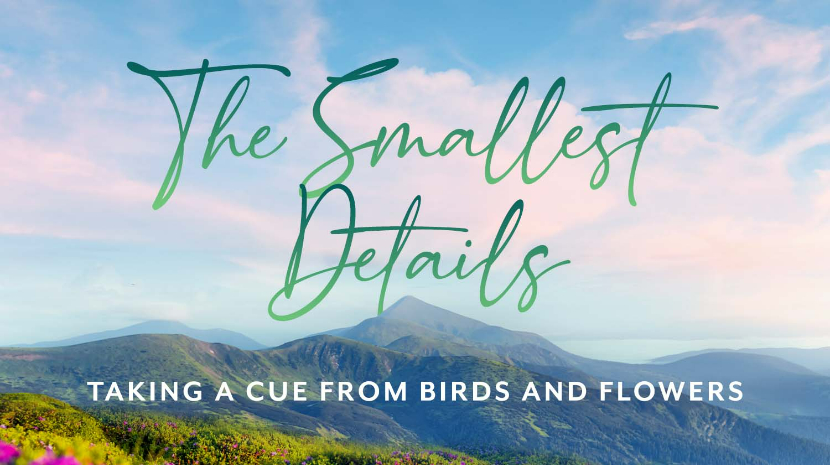From the September 2022 Issue

The Smallest Details
Taking a Cue From Birds and Flowers
On March 3, 2022, a baby bald eagle was hatched in a massive nest, 120 feet off the ground, near the shore of Big Bear Lake, California. Since adult eagle pairs usually stay together for life and often return to the same nest every year, a wildlife conservation group set up a video camera in the pine tree ahead of the birth to watch the drama unfold.
The female eagle, named Jackie by the conservationists, laid two eggs, and the male eagle, Shadow, kept her supplied with fish from the lake as she brooded over her eggs. When the first eaglet was hatched, it set off a video viewing frenzy around the world via the live web cam. (Sadly, the second egg never hatched, for unknown reasons.) At any given time during the day, there were thousands of viewers watching this eagle couple prepare their young charge, affectionately named Spirit, for its first flight. To the excitement of all watching, Spirit’s first flight occurred on May 31, 2022!
We realize how much we can learn about Him from observing His creation.
And we aren’t alone. King Solomon of Israel was one of the world’s earliest nature lovers. In modern terms, he was a zoologist, botanist, taxonomist, and naturalist. He often used examples from nature in his voluminous writings: “He spoke three thousand proverbs, and his songs were one thousand and five. Also he spoke of trees, from the cedar tree of Lebanon even to the hyssop that springs out of the wall; he spoke also of animals, of birds, of creeping things, and of fish. And men of all nations, from all the kings of the earth who had heard of his wisdom, came to hear the wisdom of Solomon” (1 Kings 4:32-34).
Given his limited geographical exposure and tools he had to work with, Solomon could only have known about a tiny fraction of the plants and animals in the world. It wasn’t until a Swedish scientist named Carl Linnaeus began to systematically categorize the world’s plants and animals that we started to grasp the order and diversity of nature. He published his first findings in 1735 in a document called Systema Naturae. By the tenth edition, published in 1758, his classifications revealed 4,400 species of animals and 7,700 species of plants.
Kudos to Professor Linnaeus for his herculean efforts, but even his lists fell far short of modern knowledge. While his system of classification is still in use today, his numerical counts have been greatly expanded by modern scientists.
The current numbers of plant and animal species vary widely depending on who is counting and how. But I have read that there are more than 10,000 known species of birds and around 369,400 known species of flowering plants on planet Earth.
If God so cares for the birds of the sky and the flowers of the field, will He not also care for us?
Jesus’ Attention to Details
Solomon observed details in the natural world and drew life lessons from his observations—like how ants instinctively provide for themselves (Proverbs 6:6-11). He cited other small animals and noted their wisdom (Proverbs 30:24-28). Jesus did the same thing, focusing on birds and flowers. Like Solomon, Jesus drew huge lessons from tiny plants and animals in nature.
The best example of Jesus’ lessons from nature is found in Matthew 6:25-35. He noted how God takes care of birds and flowers as a way to illustrate how God will take care of us. His main theme is in verse 25: “Therefore I say to you, do not worry about your life, what you will eat or what you will drink; nor about your body, what you will put on.” And why should we not worry about such necessities in life? Because of the way God cares for all of His creation—for example, the birds of the air and the flowers of the field. Birds and flowers are very different, of course. But they have one thing in common: God cares for them both.
The online viewers watching the eagle family in California have marveled at their skills. The parents built a nest seven feet in diameter to withstand ferocious mountain winds. The mother eagle sat patiently, covered in rain or snow, while she protected her eggs and then her young eaglet. And multiple times each day, both parents retrieved fish and small waterfowl for the family to eat.
Who taught them these life-support skills? Jesus could have cited Job 38–40 as evidence of how God takes care of His creation, but He boiled it down to the examples of birds: “Look at the birds of the air, for they neither sow nor reap nor gather into barns; yet your heavenly Father feeds them” (Matthew 6:26). Birds don’t worry about their daily provisions or responsibilities. It’s as if they know that God is the Source of their provision.
And what about clothing? “Consider the lilies of the field, how they grow: they neither toil nor spin; and yet I say to you that even Solomon in all his glory was not arrayed like one of these” (verses 28-29). Same question: Who taught the flowers of the fields to create such magnificent beauty and aromas? Same answer: It is “God [who] clothes the grass of the field” (verse 30).
Jesus’ point was this: If God so cares for the birds of the sky and the flowers of the field, will He not also care for us? Jesus even asked: “Are you not of more value than they?” (verse 26)
One of my most disliked phrases in our modern culture is one we hear all the time: “The devil is in the details.” Wrong! God is in the details! Nothing in His creation is overlooked by Him. From the tiniest bird to the most beautiful flower, God is in the details.
Jesus wondered at the details revealed in God’s care for nature. Sadly, ignoring that evidence, we tend to worry about the details of our lives.
Our Attention to Details
Here’s one more statistic from the world of nature: Estimates are that there are somewhere between 50 billion and 30 billion birds alive on planet Earth at any given time. Think about those numbers—then think about this: “Not one of them falls to the ground apart from your Father’s will” (Matthew 10:29). And neither will we. That was the point of the 1905 Gospel song, “His Eye Is on the Sparrow.” If God can keep His “eye” on billions of birds, don’t you think we can trust Him to care about the details of our life?
What are those details? Jesus summarized them as food and clothing (as did Paul in 1 Timothy 6:8). There are more details, of course—health, finances, children, daily tasks of life, and much more. But instead of worrying about those details, we ought to wonder at God’s provision for His creation. He knows and cares about the tiniest details of all He has created. And that certainly includes us—those who bear His image and represent Him on earth.
We can’t avoid giving attention to details in life. The question is, will we wonder or will we worry? If we continue to saturate our heart and mind with the Word of God—its promises and examples of provision—we will replace worry with wonder. If we walk by faith instead of by sight (2 Corinthians 5:7), we will not doubt that God’s answers and provisions will come. Jesus said that God knows about every need and detail of our life (Matthew 6:32). If you seek Him and His Kingdom first, “all these things shall be added to you” (verse 33).
Never forget: God is in the details of His creation which includes your life! Therefore, “Do not worry” (verse 31)!
More Articles
This Month's Magazine Resource

What God Promises You
Using Scripture and powerful, real-life stories, Dr Jeremiah helps you not just understand these promises but also claim them as your own.
Subscribe Now
Each month, read articles and devotionals from Dr David Jeremiah that will encourage, challenge, and strengthen your walk with the Lord.






















